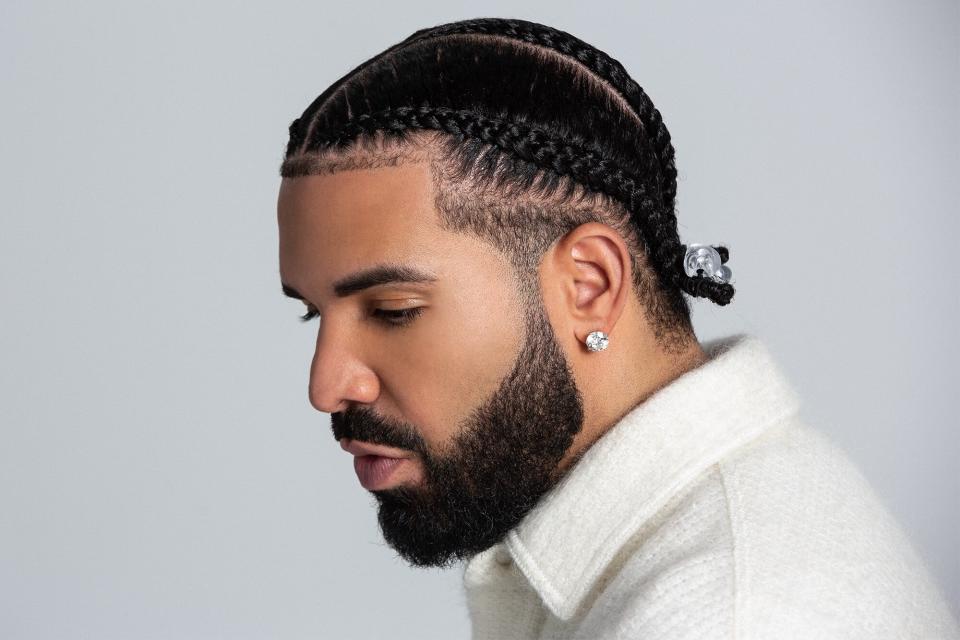Honestly, Nevermind review: Drake hits the dance floor — but does he really move the needle?
- Oops!Something went wrong.Please try again later.
In recent years, Drake albums have become showcases for his worldly palate, a chance for him to flex his knowledge and connections by distilling a wide range of influences into slick earworms stocked with memorable one-liners that often serve as the main attractions. His 2009 breakthrough mixtape, So Far Gone, brought together chopped-and-screwed rap, '90s R&B, and Europop. His fondness for East-meets-West fusion continued through subsequent projects, with him mining enough sources of inspiration — everything from trap and grime to reggae and Afrobeats — to earn him a reputation as one of Top 40's most dependable chameleons. On Honestly, Nevermind, his seventh studio effort, the Canadian star takes things a step farther, all but abandoning regional hip-hop rooted in Atlanta, Memphis, and Houston for a melodic, downcast LP influenced by South African house and Baltimore and Jersey club music.
Daring his audience to accept him as a sad boi moping under the mirrorball rather than a modelizer popping bottles in the roped-off VIP section isn't exactly an act of reinvention. Dance music has been key to Drake's brand since as far back as 2011, when he crooned with Rihanna on the brilliant Gil Scott-Heron– and Jamie xx–sampling banger "Take Care." He later dabbled in '80s post-disco on 2013's "Hold On, We're Going Home" and dove headfirst into dancehall and U.K. funky for 2016's ubiquitous No. 1 smash "One Dance" and its successors "Controlla" and "Too Good." Savvy if slight detours are the artist's signature, but on his latest full-length he's attempting a total pivot, eschewing his blowhard rap persona to lean almost entirely on his singing voice, a forlorn instrument that floats over nearly all of its 14 tracks. The production here is airy; his thoughts are heavy.

Republic Records Drake
Collaborators Black Coffee, Gordo (formerly known as Carnage), and Noah "40" Shebib supply Drake with a subdued, sometimes recessive backdrop, allowing his cooing falsetto and plaintive songwriting (relationship woes, not his frenemies, got him down this time) to take center stage. When it all blends right, the pairing yields some genuine highlights. On "Texts Go Green," he repeatedly laments, "You're dealing with me rough" over a pool of watery synths, spiraling and coming off as desperate as he ever has ("I'm the last person that needs to rush anything"). "Flight's Booked" samples Floetry's 2003 cut "Getting Late" and enlists Congolese singer Mukengerwa "Tresor" Riziki for a soulful, pulsating late-night comedown. "Calling My Name" serves up a full-on ballroom moment, complete with a saucy, undeniable declaration tailor-made for the stunt queens ("Your pussy is calling my name"), while "A Keeper" flaunts a pithy Drizzy diss ("I found a new muse/That's bad news for you") that fits nicely into his ever-growing catalog of kiss-offs. Meanwhile, the fact that the effortless, techno-indebted "Sticky" and aggressive closer "Jimmy Cooks" (featuring 21 Savage) feel more like traditional Drake joints is a good thing — they offer something familiar for fans scratching their heads over a hip-hop titan's foray into "oontz-oontz music."
But in clinging to the same references and tempos for a sizable chunk of the record, Drake ultimately shortchanges himself. His singing, though lovely at times, can carry him only so far, and while the production is certainly more adventurous than what we heard on 2021's overstuffed, plodding Certified Lover Boy, its lack of texture underscores Drake's limitations both as a lyricist and a vocalist. With its sample of Trillville's "Some Cut," the two-and-a-half-minute sex jam "Currents" finds him hesitating to "come on too strong," yet its relentless, pummeling bass and squeaky-mattress effects push things so far past subtlety that he threatens to break the bed frame (without providing any sort of rush or release). "Overdrive" boasts some sly guitar licks, but his monotonous, almost robotic delivery lulls it into hold-music territory. With gorgeous additional vocals from Beau Nox, "Down Hill" hints that it might blossom into a blissed-out Afropop anthem, but instead, it melts into a puddle of new-age-y goo; luckily, it's followed by the uplifting standout "Ties That Bind," which evokes Sade headlining a circuit party.
Honestly, Nevermind is categorized as "dance" in Apple Music, but it's that in name only. Drake has been chilling in his comfort zone, nudging the dial up a notch or two, for a solid six years. This was a chance for him to call on Chicago and Baltimore giants, divas and divos alike, to craft an album of euphoric, swooning, dirty, unabashed house. But instead of taking a much-needed left turn and cranking it up to 11, he's settled for something safe — something too smooth, too worldly.
The good news? Mere days after Drake dropped Honestly, Nevermind, Beyoncé unveiled her latest single, "Break My Soul," a more layered, joyous, wholehearted stab at dance music, marrying the early-'90s house of divas like Robin S. and Crystal Waters with the rowdiness of New Orleans bounce ("Formation" guest Big Freedia shows up for another cameo). If these experiments from two of pop's reigning tastemakers are any indication, the next 12 months could very well be dominated by the loud, busy, crazy, exuberant sounds of three decades ago. Honestly, that's reason enough to celebrate. B-
Honestly, Nevermind is out now.
Sign up for Entertainment Weekly's free daily newsletter to get breaking TV news, exclusive first looks, recaps, reviews, interviews with your favorite stars, and more.
Related content:

